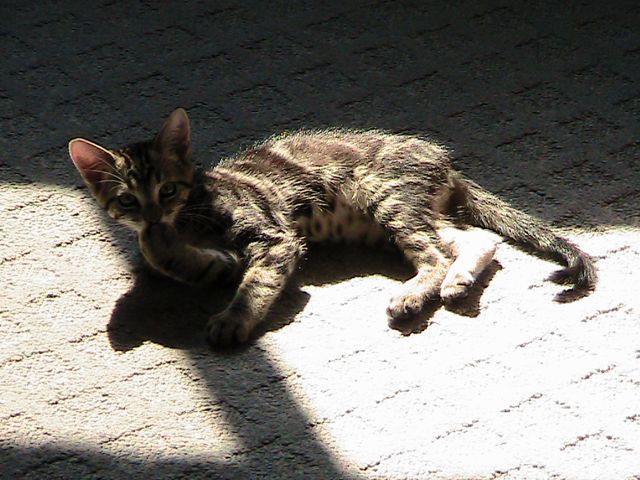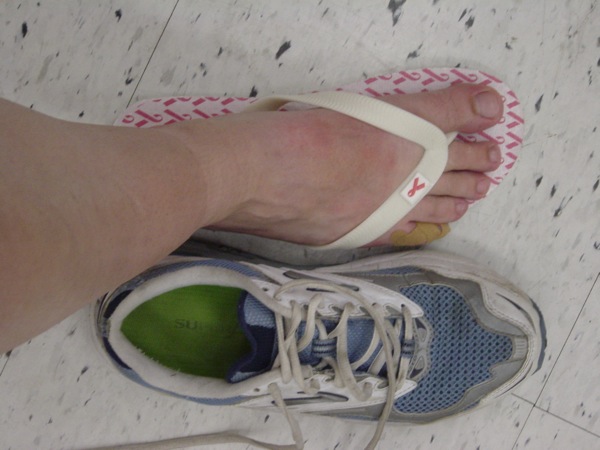I had originally meant to write about our recent trip to McDonalds (yes, I know; “this you need to write about?” But it was our first Mickey D’s food in—what, five years? more?), but that all changed when I went out to get the mail and saw—Eloise, I’ll call her—tottering up the road towards me.
Eloise and her late husband were the second of the three families who have inhabited the little single-story house across the street from us since we moved into the neighborhood in 2001. Our first neighbors decided that they needed more space for all their photographic equipment and put the place up for sale a year or so after we moved in (pure coincidence, I assure you). Their house was purchased by James and Eloise, an affable pair of seniors whose son and his wife lived just down the street.
They were your basic classic Old Married Couple, as quintessentially Middle American as a Norman Rockwell painting. They took walks together, worked in the yard together, watched the news on their ginormous projection TV together. Just about the only thing they didn’t do together was die.
A while—a year at least, maybe two—after they moved in, James succumbed to a recurrence of a previous cancer. He died at home, with his family by his side, right around Christmas. Eloise was, of course, devastated. I took to having the occasional long conversation with her out front of her house, and she didn’t try to disguise her feelings. “I don’t know why I’m alive,” she confessed once. What do you say to that? Yeah, me neither? If I were in your shoes, there isn’t the merest scintilla of doubt in my mind that I would be sacked out in a running car in our garage inside a week? That I am filled with a sense of overwhelming relief every time I look at my male, overweight, diabetic self and remember that I am far more likely to die before my wife than after, and will therefore in all likelihood never have to go through what you’re going through right now?
What I said, with all the compassion I could muster, was, “Because it isn’t your time yet.” Pallid, empty, useless platitude. Not that there was anything better I could have said.
Over time Eloise got, if not over, then at least past her loss. She continued to live across the street, frequently visited by her grandson down the road, of whom she was quite fond and fiercely proud. We continued to chat on and off—sweet lady, but both she and her late husband could talk the barnacles off a tugboat’s hull—until she announced that she was putting her house up for sale and moving into the large, well-appointed senior home about half a mile down the highway. I still saw her just about every day. Eloise comes from hardy stock: hard work and (no doubt) clean living have given her endurance and energy to spare. I have no doubt that she could walk my flabby ass into the ground, every day of the week and twice on Sundays—all the while waxing enthusiastic about her grandson’s recent violin recital.
As the months wore on, Eloise’s mind began to fade even as her body seemed to continue to flourish. At first it was just her memory; she could remember all the important moments of her life, but couldn’t hold on to new names or places. I think that she might have become somewhat difficult to work with at her new digs, because soon after I noticed these changes she moved in with her son’s family at the other end of our street. She confided in me at one point during a conversation on her son’s patio that, seemingly overnight, she had lost the ability to read. Her sense of bewilderment and stoically graceful depression took its toll on me. Our chats became less and less frequent over time, entirely by my (in)action.
At this point, Eloise has become something of a figure in the neighborhood. She spends her time walking up and down the street, stopping to survey her old house. Occasionally she’ll stop to talk with the current owner, if he’s out front fiddling with his woodworking tools. Otherwise, she gives the place a brief once-over—what’s going through her mind, I can only imagine—before turning around and trudging back home. She does this numerous times a day. If she’s not heading to or from her current abode she’s often sitting against the low fence out front of her son’s house, picking flowering weeds from the yard or just watching the cars go by. I wave to her every time I pass her, and she always waves back. But that’s about as far as I have taken it recently. Until today.
Eloise was just rounding the crest of the hill at about the midpoint of our street when I went out to the bank of locking boxes to retrieve our mail. I felt that rotten little poison blowdart of tension you feel when you wrestle with avoiding someone you really ought not, trying to decide whether they’ve spotted you, whether there’s any chance whatsoever that they might think you haven’t spotted them, that they might interpret your failure to stop and chew the fat as simple obliviousness on your part. No chance of that in this case, so I put on my man pants and waved hello. We met up in the driveway of the next neighbor down and exchanged pleasantries.
It was obvious from the get-go that she had gotten considerably worse. She put up a good front, but obviously did not know who I was. That didn’t really matter, however, because she was desperate to talk to someone, and apparently I qualified. She asked if I was taking a walk and I replied that I had just come out to get our mail. “Oh,” she said wistfully, “I thought maybe you were going to keep walking down that way.” She pointed back the way she’d come. “Nope,” I chirped, wishing a meteor would come crashing to earth that very second and smash me flat—hell, smash us both—”Just out to get my mail and take in my garbage cans. So, how are you doing?”
Bad question. I won’t go into details here, but she began to relay a very distressing story about her children, and their plans to take all of her money. I don’t give the story much credence; the son she’s living with is a successful oral surgeon who would not seem to need the dough, and she kept confusing details—referring to her late husband and her (presumably) late father interchangeably, for instance. I listened sympathetically for a bit, grinding my mental molars all the while, until the neighbor’s car pulling into the driveway broke our conversational continuum and gave me a chance to make a break for it.
“Well, I’ve got to go put my garbage cans away and get dinner on,” I said brightly. I bade her farewell and beat feet.
This is the kind of exchange that leaves me feeling husked-out and utterly vanquished, physically and morally. I’m not a cold person by nature, but in the face of a seemingly endless well of a near-stranger’s tragic need, the chasm yawns before me and I turn tail and run. I retreat to my comfortable home, my cherished partner and my mountains of toys. I don’t know whether I’m selfishly trying to preserve and protect my limited free time from the unquenchable hungers of people who don’t really matter to me and aren’t my problem, or if I’m reflexively trying to stave off acknowledgement of my own inevitable descent into decrepitude by fleeing from someone who desperately needs a little compassion. More to the point, I don’t know which would be worse, would be less understandable, more deplorable.
When I think of the possibility of someday becoming that person, becoming the shuffling ghost on the streets of my neighborhood, I am filled with terror. The way I think now, I would hope that I would find it in me to kill myself long before that ever happened. But I bet lots of people think that way when they’re thirty, forty, fifty years old. Life has a way of wanting to perpetuate itself, even when it has lost much of its savor. And truth be told, I don’t really know what goes on in her mind. How much does she remember at this point? Does she really know her circumstances? Does she continue to mark her passage through time? Or are her days spent in a perpetual twilight of moments, strung together but separate like beads on a choker?
All I really know for sure is that I will never walk down my own street any further in the direction of Eloise’s place than my own mailbox for the rest of her life. That knowledge shames me almost more than I can stand.
 Uncle Andrew
Uncle Andrew




 Margaret
Margaret